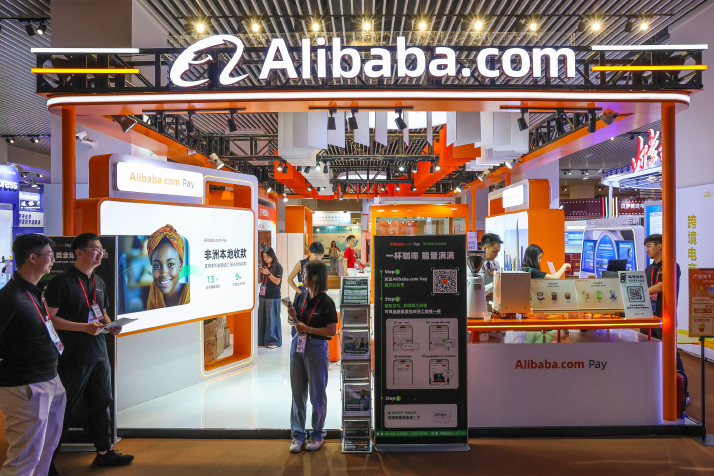| Business |
| China's platform giants are poised to drive the next wave of economic growth | |
|
|
 Couriers sort packages at a JD Logistics branch in Huzhou, Zhejiang Province, on November 11 (XINHUA)
On April 20, 1994, China made its first official full-function connection to the World Wide Web through a 64-kilobyte international leased line, marking the country's formal entry into the global digital age. This year is the 30th anniversary of country's entry into the Internet era. Over the past three decades, the Internet has also undergone a remarkable transformation. It has evolved from a primarily desktop-driven experience to a mobile-first technology, with content shifting from text and images to video and live streaming. Distribution methods are shifting from websites, forums and blogs to self-media platforms and algorithm-driven recommendations. The Internet is now powered by e-commerce and artificial intelligence (AI), giving rise to a profound and ongoing revolution in how we connect, communicate and consume. Throughout this transformation, online companies have ridden the waves of change, catalyzing progress and driving economic growth while adapting and reinventing themselves in the process. Among them are platform companies, which create online marketplaces where buyers and sellers can meet to conduct transactions. As the future unfolds, what new vitality can platform companies bring to China's economy? A symphony of success The latest report on the platform economy from the China Academy of Information and Communications Technology revealed a strong post-COVID recovery among leading platform companies in 2023. The top 10 listed platform companies reported a combined revenue of 3.6 trillion yuan ($496 billion), a 12.7-percent year-on-year growth that reversed the previous downward trend. Their total net profit surged to 385.4 billion yuan ($53 billion), an impressive 42.4-percent increase over the previous year. In recent weeks, top platform companies have unveiled their third-quarter (Q3) financial reports, reflecting outstanding performances, both in terms of revenue and profit. In Q3, tech conglomerate Tencent, online retailer JD.com, e-commerce giant Alibaba and budget shopping platform Pinduoduo each posted robust profit growth, with increases of 47 percent, 47.8 percent, 63 percent and 61 percent, respectively. Behind these figures lies the relentless effort of each platform company, with the financial reports highlighting their key business focuses and notable achievements. A key highlight of Tencent's Q3 report is its investment in research and development (R&D). R&D expenses for the quarter reached 17.9 billion yuan ($2.5 billion), a nearly 9-percent increase year on year. Since 2018, the company has invested a total of 320.5 billion yuan ($44.2 billion) in R&D. The company emphasized its ongoing commitment to investing in AI technologies, tools, and solutions. Thanks to its continuous investment in R&D, Tencent's AI technologies are rapidly being applied across a wide variety of sectors. In Q3, the company launched its latest-generation large language model Hunyuan, which has doubled both training and inference efficiency while halving inference costs compared to its predecessor. The Hunyuan model has been deeply integrated into over 700 business functions and scenarios. JD Logistics, the logistics arm of JD.com, continues to strengthen its profitability. In Q3, it reported a net profit of 2.57 billion yuan ($355 million), a remarkable year-on-year increase of 205.1 percent. JD Logistics CEO Hu Wei said that, throughout this year, the company has consistently delivered strong year-on-year profit growth in each quarter. This performance is a result of the company's continuous efforts to upgrade its network products and technologies, enhance the efficiency of its core resources, and leverage economies of scale. On November 21, Alibaba CEO Wu Yongming announced the creation of the Alibaba E-Commerce Business Group in an internal e-mail. In his message, Wu emphasized that both the Chinese and global e-commerce sectors are entering a new era, where the ability to manage global supply chains, ensure efficient fulfillment, and provide superior consumer service will shape the future competitive landscape. The newly formed business group will unify all of Alibaba's e-commerce resources, leveraging years of accumulated expertise to better serve both domestic and international consumers, while helping more small and medium-sized enterprises expand into both local and global markets. This move is seen as Alibaba's clear strategy of focusing more on its core business, e-commerce. In the last quarter, Pinduoduo rolled out several major initiatives aimed at strengthening its ecosystem. These included offering consumer subsidies, lowering shipping costs for merchants delivering to remote regions, and providing greater support for businesses on the platform. While these moves are designed to drive long-term growth, they had a notable impact on the company's short-term financial results. "We've made a substantial increase in our ecosystem investments this quarter, and the feedback from both supply and demand sides has been highly positive," said Chen Lei, Chairman and Co-CEO of Pinduoduo. Looking ahead, he reiterated the company's focus on high-quality growth, aiming to strengthen its platform and ecosystem in the coming quarters to deliver long-term value for users, merchants and the broader market.  Alibaba's booth at the 136th Canton Fair in Guangzhou, Guangdong Province, on October 15 (XINHUA)
Upgraded confidence "The platform economy has emerged as a vital engine driving economic growth," Pan Helin, a researcher with the International Business School at Zhejiang University, told Beijing Review. According to the National Bureau of Statistics, from January to October this year, China's online sales of physical goods accounted for 25.9 percent of the total retail sales of consumer goods. The platform economy has also contributed a lot to absorbing the country's flexible workforce of over 200 million people. A recent executive meeting of the State Council, the country's highest state administrative organ, stated on November 21 that developing the platform economy is crucial for expanding domestic demand, stabilizing employment, benefiting people's livelihoods, empowering the real economy and developing new quality productive forces. The State Council's efforts to promote the platform economy aim to invigorate the real economy, foster the emergence of new business models, and support China's economic transformation and upgrading, while driving innovation and sustainable growth, Pan said. Pan further explained that the platform economy plays a key role in expanding domestic demand by more efficiently connecting supply and demand, thereby energizing the market. And it is a major source of employment, with tens of millions of workers in urban service sectors relying on platform-based jobs. Additionally, it contributes to public welfare by enabling the distribution of public goods, such as the government's consumption subsidies, which were channeled through e-commerce platforms during this year's Double 11 (November 11) shopping festival. This is yet another instance of the Central Government's growing focus on the platform economy. The Third Plenary Session of the 20th Central Committee of the Communist Party of China called for fostering innovation within the platform economy and establishing a robust, ongoing regulatory framework. In July, the State Council reiterated the importance of ensuring the platform economy's sustained and healthy development. In August, an article by Minister of Industry and Information Technology Jin Zhuanglong further underscored the need to drive innovation and growth in this sector. Moving forward, it is crucial to continue fostering the sustainable growth of the platform economy by ensuring a level playing field for market competition. This requires strengthening the regulation of platform content and products in order to stabilize expectations for both platform businesses and their users, ultimately boosting confidence across the board, Pan said. BR (Print Edition Title: In Full Gear) Copyedited by G.P. Wilson Comments to zhangshsh@cicgamericas.com |
|
||||||||||||||||||||||||||||||
|